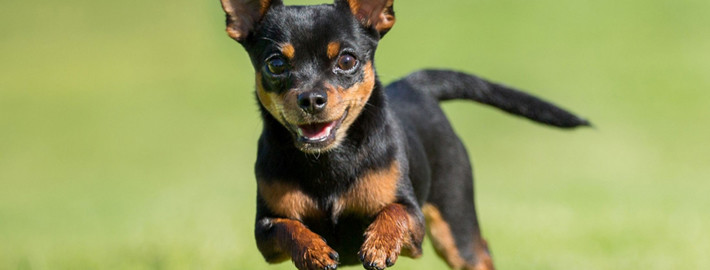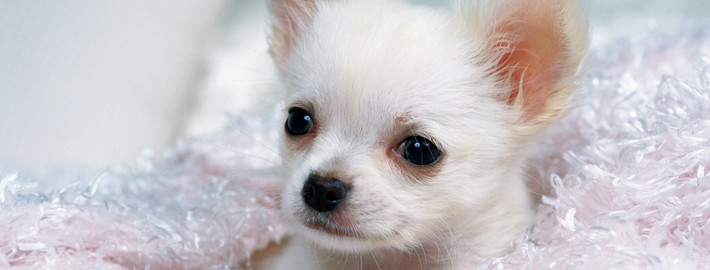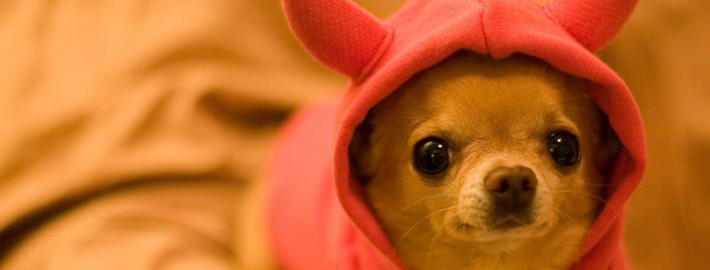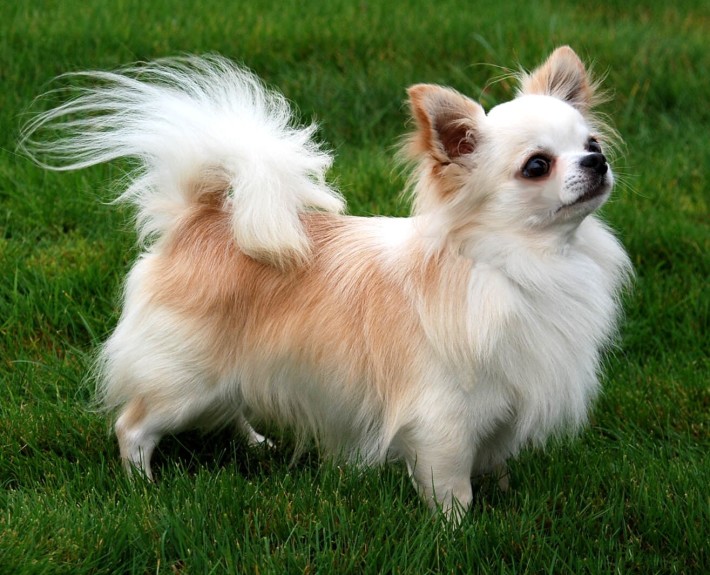What makes the Chihuahua Unique?
Loud, proud, and feisty, the Chihuahua is a petite bundle of energy. These small dogs are ideally suited for apartment life and have been known to travel around in the purses of their owners. Yet, in their own minds, Chihuahuas are the size of pit bulls and act accordingly.
Breed Groups
Page Contents
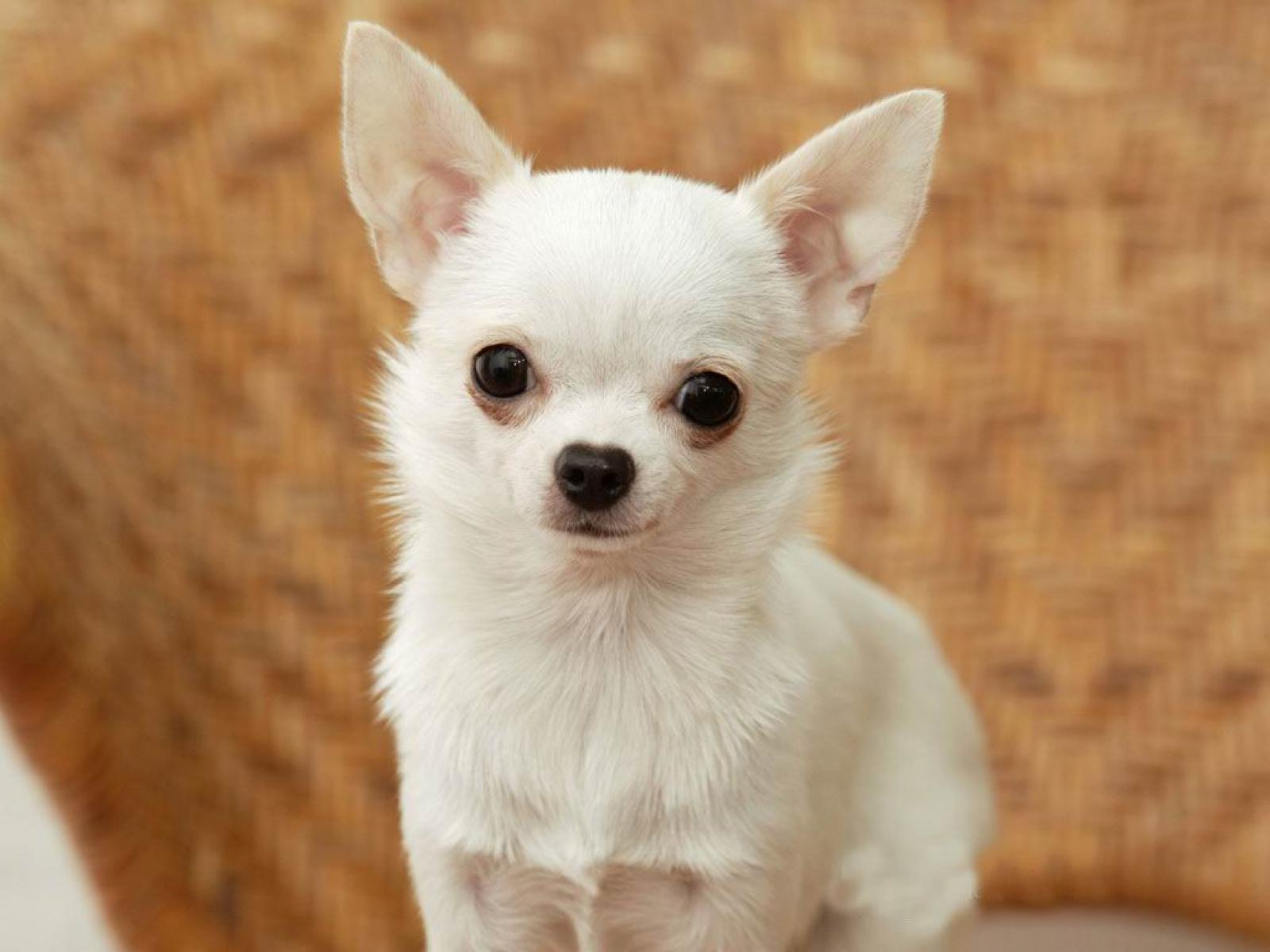
Is the Chihuahua Right For You?
The Chihuahua is graceful, small and compact; it is slightly longer than it is tall. It has a saucy expression and an alert, terrier-like attitude. It should move out at a swift pace with good reach and drive. Chihuahua has earned its place as a favored toy dog because of its intense devotion to a single person. It is reserved with strangers but good with other household dogs and pets. Some try to be protective, but they are not very effective.
In 5 Words
- Lively
- Devoted
- Alert
- Quick
- Courageous
Characteristics
Learn About the Chihuahua
Description
Chihuahuas are the smallest recognized dog breed and they come in a wide variety of sizes, head shapes, colors, and coat lengths. The apple-shaped head is a breed standard, however. These dogs are typically petite with large eyes and upright ears. Thier ears should not be cropped.
Size
On average, these dogs are between 4 to 10 pounds and measure between 6 to 10 inches at the shoulder blades, or the withers. The breed standards say that Chihuahuas should be below six pounds in weight, but breeders may caution potential owners against buying exceptionally diminutive dogs.
Coat
Chihuahuas come in all colors. No color or marking type is considered to be a fault in this breed, except perhaps merle which has been banned by the F.C.I. (Fédération Cynologique Internationale) and a number of countries around the globe. Even on long haired varieties, these dogs have thin coats but having a coat that is considered too thin will disqualify a Chihuahua from the showring.
Short History of the Chihuahua
Mexico is the original location of these diminutive divas, as both folklore and archeological evidence will attest. It is a common belief is that the Techichi, a pet favored by the Toltec civilization, are the ancestors of the modern Chihuahua breed. Records of the Toltec civilization prior to the 9th century are not available, yet dog pots from Colima, Mexico have been found dating back to 300 B.C. and they are thought to depict Techichis.
At some point in time, the Techichis may have been crossbred with a hairless type of dog, which resulted in the modern Chihuahua. These dogs may then have eventually traveled to Europe from the New World with Columbus or one of his sailors. Regardless of their mysterious origins, the breed was recognized by American Kennel Club AKC) in 1904 and, according to the AKC, the Chihuahua currently ranks as the 13th most popular dog type.
Temperament
They are generally good with other household dogs and pets, though Chihuahuas can be a bit snobby and tend to prefer others of their own breed. These dogs are also very affectionate to the one person they deem worthy of their attention and generally the rest of their families, but they do not like strangers of any kind. For their size, Chihuahuas are excellent watchdogs. However, these dogs can become boredom barkers if not properly trained.
As with some small breeds, Chihuahuas are unaware of how diminutive they are and will not hesitate to challenge larger dogs. They have terrier-like personalities as a whole and are prone to digging and chasing smaller animals. Chihuahuas are also well known for being rather temperamental. The result is that they are generally not good around small children.
Caring for Your Chihuahua
General Health
In good health Chihuahuas can live over fifteen years. There are a few major health concerns for the Chihuahua breed such as windpipe collapse and patellar luxation. The latter is common on small dogs and is basically a dislocation of the knee cap. If this breed starts limping or hopping about it is a good idea to take it to the vet. Pulmonic stenosis, hydrocephalus, portosystemic shunt, and KCS are all additional but minor health concerns in this breed. Very small Chihuahuas may also be prone to hypoglycemia.
In addition to these things, a soft spot in the skull called a molera is a common breed trait. This can occur due to incomplete fontanel closure. While this can lead to seizures in some Chihuahuas, the condition typically doesn’t pose any health risks. Yet, dogs who are diagnosed with this condition are more likely to suffer head injuries should refrain from rough horseplay. Therefore, Chihuahuas with molera spots are not well suited for homes that also contain larger dogs or very small children.
Due to their short or thin coats and warm native environment, Chihuahuas will react badly to cold. In cool climates, outfitting them with sweaters or jackets is a very good idea. As with any toy breed, care should be taken of both the dog and small children when they are in contact with one another. Young children tend to view toy dogs as inanimate objects and toddlers may trip over family pets. This can cause problems as Chihuahuas are known to bite if handled too roughly.
Grooming & Bathing
When bathing Chihuahuas care should be taken not to let them get too cold. They should be dried with a towel or a blow drier and not be allowed to air dry. While the dogs can be bathed as often as several time per week, once or twice a month is perfectly adequate.
Daily
The Chihuahua is a lively dog, but can get its exercise running from room to room indoors. It enjoys exploring the yard or going for short walks on a leash and especially enjoys accompanying its family on outings.
Weekly
Smooth coated Chihuahuas need very little grooming, but the long haired varieties need brushing two to three times weekly. Long haired Chihuahuas do shed once or twice a years, so owners should be aware of that. A soft bristle brush works best for overall brushing, but a wire brush is good for areas prone to tangling or matting. Brushing a dog’s teeth once a week, if not more frequently, can prevent the onset of periodontal diseases which is a concern in most older dogs.There are now both toothbrushes and toothpaste on the market for dogs.
Monthly
As with any dog breed, Chihuahuas should have their nails trimmed on a regular basis. They should also have heartworm, flea and tick prevention medicine given to them every month. Chihuahuas’ large ears also benefit from a regular cleaning using a cotton ball and special solution that can either be purchased at your veterinarian’s office or at a pet supply store.
Exercise & Training
This dog breed is very smart, which can sometimes lead to the question of who exactly is being trained. Though they have a bad reputation as a breed for as for getting away with habits that would be forbidden in larger dogs, Chihuahuas can be trained. They respond well to rewards-based learning. However, as they are very tiny dogs, care should be taken that they don’t overindulge in goodies.
~Sources: Vetstreet, Dog Breed Info Center, AKC, UKC, Wikipedia, Animal Planet, previous materials

